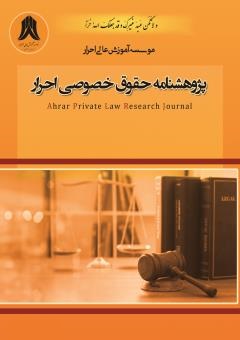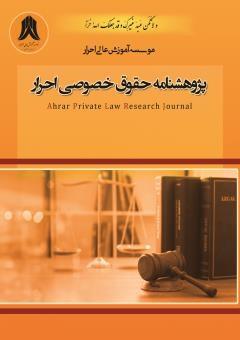A Comparative Study of Identification and Implementation of Foreign Judgments in Civil and Commercial Matters in Iranian Law and the Hague Convention of 1971
Subject Areas : حقوق بین المللAbasat Pour mohammad 1 * , Faeze Jahani moghadam 2
1 - Assistant Professor of Private Law, Department of Law, Faculty of Humanities, Urmia Branch, Islamic Azad University, Urmia, Iran.
2 - PhD student in private law, Department of Law, Faculty of Humanities, Urmia Branch, Islamic Azad University, Urmia, Iran.
Keywords: Hague Convention, civil and commercial judgments, Iranian laws,
Abstract :
In the development of international relations, the identification and implementation of judgments issued by foreign courts are of great importance. Among the international organizations in The Hague, the Hague Convention is unique in the field of private international law, and among them, the 1971 Hague Convention represents a turning point in international efforts to create uniform laws and principles for recognizing and enforcing foreign judgments. In Iranian laws, the conditions for identifying and enforcing judgments are also stated in Article 169 of the Civil Procedure Code. In this article, a comparative study is attempted using library research method and descriptive-analytical approach on the identification and implementation of foreign judgments in civil and commercial matters with a focus on the provisions of the 1971 Hague Convention and Iranian civil laws.
1.Almasi, Najad, A. (2004). Conflict of Laws, Tehran, University Press Center, 11th Edition. [In Persian]
2. Batiffol, H & L, Paul (1983). Droit international Prive. 7eme. Ed., Paris, Libraire generale de droit ET de Jurisprudence.
3. Hague Conference on Private International Law, Actes et documents de la Session extraordinaire (1966), Exécution des jugements (514 pp.).
4. Jalali, M, and Nourian, A. (2020). A Comparative Study of the General Conditions for the Recognition and Enforcement of Foreign Judgments in Iranian and European Union Law. Journal of Public Law Studies, Volume 50, Number 2, Pages 771-792. [In Persian]
5. Katouzian, A. (2000). Civil Law in the Current Legal Order, Tehran: Dadgostar, Fourth Edition. [In Persian]
6. Kashiarayi, R. (2011). The Conditions for the Enforcement of Foreign Judgments Based on the Validity of the Decree, Tehran: Tehran University Publications, Number 18. [In Persian]
7. OJ 2007, L 339/3, https://eur-lex.europa.eu/legal-content/EN/TXT/PDF/?uri=CELEX:22007A1221(03) &from=EN.
8.OJ 2012, L 351/1, https://eur-lex.europa.eu/LexUriServ/LexUriServ.do?uri=OJ:L:2012:351:0001:0032:En: PDF, as modified by Regulation 542/2014 and Regulation 2015/281.
9. Teitz, L.E., .(2019).Another Hague Judgments Convention? Bucking the Past to Provide for the Future’, Duke Journal of Comparative & International Law (29) . pp. 491-511, https://scholarship.law.duke.edu/djcil/vol29/iss3/7.
10.Safaei, S H. (2003). Preliminary Course of Civil Law, Volume 2, Tehran: Mizan. [In Persian]
11.https://www.hcch.net/en/states/hcch-members
12.https://assets.hcch.net/docs/bacf7323-9337-48df-9b9a-ef33e62b43be.pdf
13. https://www.hcch.net/en/instruments/conventions/full-text/?cid=34.
14. https://www.hcch.net/en/instruments/conventions/full-text/?cid=38.
15. https://www.hcch.net/en/instruments/conventions/full-text/?cid=77.
16. https://www.hcch.net/en/instruments/conventions/full-text/?cid=78, with explanatory report by Ch. Fragistas
17.https://www.hcch.net/en/instruments/conventions/full-text/?cid=79, with explanatory report by G. Droz.

